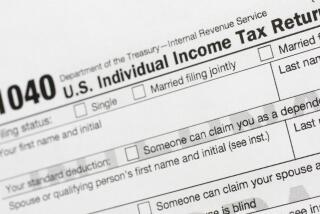Don’t scam -- or be scammed! IRS lists ‘dirty dozen’ tax frauds
Identity theft, hiding income offshore and inflating expenses are among the frauds that commonly pop out during tax preparation season, the Internal Revenue Service warns.
The federal agency, which administers tax collection, has released its annual list of the so-called dirty dozen tax scams. Such scams often become more prevalent as the tax season comes to a head; this year’s tax deadline is April 17.
The ranking is designed to protect taxpayers from the unscrupulous as well as ensure the government gets the funds it needs to operate.
“Taxpayers should be careful and avoid falling into a trap with the Dirty Dozen,” IRS Commissioner Doug Shulman said in a statement released Thursday. “Scam artists will tempt people in-person, on-line and by e-mail with misleading promises about lost refunds and free money. Don’t be fooled by these scams.”
The top scam involves identity theft. In such cases, criminals use a taxpayer’s identity information to file a tax return and claim a fraudulent refund. The IRS said it blocked $1.4 billion from going to the wrong person last year.
In January, the IRS announced the results of a national crackdown on suspected identity theft, with 105 people in 23 states targeted, the agency said.
Related to identity theft, but a second category of fraud, is phishing. These cases generally use unsolicited emails or websites to gain personal information from unsuspecting taxpayers. The information is then used to file false returns and get refunds, much as in identity theft cases.
As for hiding income offshore, it is generally legal for Americans to keep money abroad, but the funds must be declared and taxes paid. Trying to hide money, whether in an offshore bank, foreign trust or in a number of other ways, is illegal.
The IRS has been targeting this type of problem and has offered some special programs so that taxpayers can make their offshore funds legal.
Since 2009, 30,000 individuals have voluntarily come forward to disclose their foreign financial accounts, the IRS said. The agency said it has collected $3.4 billion so far from people who participated in the 2009 offshore program, reflecting the resolution of about 95% of the cases. The IRS also said it has collected $1 billion in upfront payments under a similar 2011 program.
Other scams in the so-called dirty dozen include: fraud by return preparers; false or inflated income and expenses; false claims for refunds from Form 1099, which reports income other than wages, salaries and tips; and abuse of charitable organizations and deductions.
ALSO:
Dougherty gang brothers plead guilty
Starved, kept in basement: Teen’s horrific story
Soldier charged in $630,000 theft of high-tech military gear
michael.muskal@latimes.com
More to Read
Start your day right
Sign up for Essential California for news, features and recommendations from the L.A. Times and beyond in your inbox six days a week.
You may occasionally receive promotional content from the Los Angeles Times.







